|
Atonement is an Academy Award winning 2007 film adaptation of Ian McEwan's critically acclaimed novel of the same name, directed by Joe
Wright (see more on this below), and based on a screenplay by Christopher Hampton. It was produced by Working Title Films and filmed throughout the summer of 2006 in
Great Britain and
France, starring James McAvoy and Keira Knightley. Distributed worldwide by Universal Studios, with minor releases through other divisions, the film was released in the United Kingdom and Ireland on September 7, 2007, and in North America on December 7, 2007.
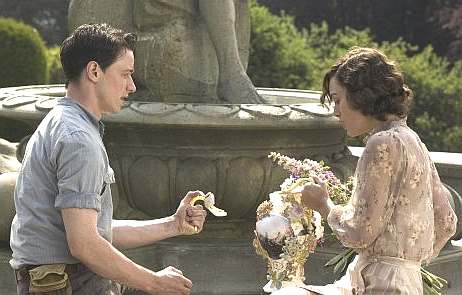
James
McAvoy as Robbie Turner and Keira
Knightley as Cecilia Tallis
As the opening film of the 2007 Venice International Film Festival, Atonement made Wright – at the age of 35 – the youngest director ever to open this prestigious festival. The film also opened the 2007 Vancouver International Film Festival.
On January 22, 2008, the movie was nominated for seven Oscars for the 80th Academy Awards, including Best Picture, Best Writing (Adapted Screenplay) and Best Supporting
Actress. The film won one Academy Award, for Best Original Score. On February 10, 2008, Atonement won two BAFTA Awards including Best Film of the Year at the 61st British Academy Film
Awards.
Plot
The film is comprised of four parts, corresponding to the four parts of the novel. Some scenes are shown several times from different perspectives.
Briony Tallis (Saoirse Ronan) is a 13-year-old aspiring writer from an upper-class English family and the youngest of three. Her older sister Cecilia (Keira Knightley) is educated at Cambridge University alongside Robbie Turner (James McAvoy), the son of their houskeeper (Brenda Blethyn), whose school fees are currently paid by Cecilia's father. Though Robbie is headed for medical school soon, he is currently spending the summer gardening on the Tallis estate. Their cousin, Lola Quincey (Juno Temple), age 15, and her younger twin brothers (Felix and Charlie von Simson) are currently visiting the family amidst their parents' divorce. Lastly, Leon (Patrick Kennedy) – Briony and Cecilia's brother – brings home a friend named Paul Marshall (Benedict Cumberbatch), who owns a chocolate factory that is acquiring a contract to produce army rations. The Tallis family is planning for a special dinner, to which Leon happily invites Robbie (who accepts, much to Cecilia's annoyance).
Briony has just finished writing a play titled The Trials of Arabella, which she describes as about "the complications of love". However, her cousins are being difficult with regard to staging the play, much to her frustration. Alone in her bedroom, she happens to witness a significant moment of sexual tension between Robbie and her sister by the fountain, when her sister strips down to her underwear and dips into the fountain, to retrieve the lost part of a broken vase. She misinterprets this as aggression on Robbie's part when in fact Robbie and Cecilia are in love, though their feelings have not been resolved. Shortly later Robbie writes drafts of apology letters to Cecilia, including one very explicit erotically charged version. On his way to join the Tallis family celebration, he asks Briony to deliver his letter only to realize too late that it is the erotic note he had not intended Cecilia to read. Briony secretly reads the letter and again misinterprets its meaning; she comes to believe that Robbie is a dangerous "sex maniac". When Cecilia reads the letter she is not offended and surprisingly is somewhat elated, though she is angry and embarrassed that Briony has opened it.
That evening Briony encounters Cecilia and Robbie again; this time they are secluded in the library, where they are having sex for the first time. However the scared Briony misinterprets their lovemaking as another one of Robbie's assaults against her sister. At dinner (where Robbie and Cecilia secretly caress hands under the table) the furious Briony is verbally aggressive towards Robbie but is cut off short when her mother (Harriet Walter) tells Briony to fetch the twins. Briony finds a note on their bed saying that they are running away back home and immediately the family members split up to search for the twins on the very large estate. As Briony goes off alone into the darkness to find them, she stumbles upon a tuxedoed man raping Lola. Though Lola – apparently traumatized – claims not to know who her attacker was (since he covered her eyes) Briony is able to convince her that it was Robbie. Back at the estate the police have been contacted. Briony insists that she "knows who did it"; that is, who raped Lola. Everyone now believes the attacker to be Robbie, while Cecilia strongly refuses to believe he is guilty. Robbie later returns from the search, with the twins safely in tow, and is arrested and sent to prison, based solely on Briony's testimony.
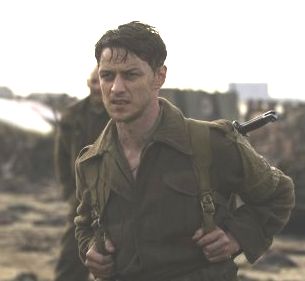
The story then moves ahead four years, to the opening phases of the Second World War. Robbie, having been convicted but released from prison on condition that he enlist, is a private in the British Expeditionary Force and is hiding in a French attic with two fellow soldiers cut off from their units during the German invasion of France. Here the dénouement of the rape accusation is shown in dialogue and flashback. Before his deployment, he was reunited with Cecilia in London, where they renewed their love, and he made a promise to return to her. Like Cecilia, Briony (now played by Romola Garai) has joined the nursing corps in London, and has tried unsuccessfully to reach her sister. Cecilia has refused contact, blaming Briony for Robbie's imprisonment. It turns out that Cecilia had broken off contact with all her family, since they all believe in Robbie's guilt.
With his two companions, the wounded and very ill Robbie finally arrives at the beaches of Dunkirk, where he is waiting to be evacuated. He is told that all the soldiers are to leave the next day and falls asleep. Shortly thereafter, at the hospital where she is a probationer nurse, Briony experiences the horror of the evacuation. In one scene, a mortally wounded French soldier dies while she is attempting to comfort him.
Robbie Turner and Cecilia TallisAfter seeing a newsreel showing chocolate magnate Paul Marshall profiting from the war, Briony attends the wedding of Marshall and her cousin Lola. By this time, Briony, who is still attempting to write, has come to understand that she misinterpreted her sister's relationship with Robbie and that she made a disastrous mistake by accusing him. She now knows that the man who was raping Lola on that night was Paul Marshall and that Lola could not admit it. On that day, Briony summons up the courage to visit Cecilia's flat and apologizes to her directly, recanting her accusation. Robbie, apparently having been evacuated from Dunkirk, emerges from Cecilia's bedroom, awakened by the commotion of their argument, and he angrily confronts Briony. Cecilia calms him, but the couple demand that Briony immediately tell her family and the authorities the truth, so that his name can be cleared. Robbie insists that she write to him (without "embellishment or adjectives") precisely what happened, and why she did it, and to give the details to a solicitor. While Cecilia and Robbie assume that a certain servant boy was the culprit, Briony reveals that she knows it was Paul Marshall, who, now having married Lola, cannot be implicated in a court of law by his wife.
The film finally shifts to an elderly Briony (Vanessa Redgrave) being interviewed about her latest novel, Atonement. During this interview, Briony reveals that she is dying of vascular dementia, and that this novel is her last, but that she began it first. Briony admits that, while the novel is autobiographical, the ending of the story has been significantly changed. In reality, she says, she never could summon the courage to see her sister and tell the truth. Robbie had died of septicemia on the last night of the evacuation at
Dunkirk (1 June 1940), and Cecilia was drowned in October of 1940, in the Balham tube station disaster (October 14, 1940) during The Blitz. Briony expresses deep remorse and says that this novel, to which she gave an ending different from the reality, had been her chance to give her sister and Robbie the hope and the happiness that they had deserved—and that she had stolen from them. The novel is, therefore, her atonement for the naïve but destructive acts of a 13-year-old child, which she has always regretted.
The film closes with a scene of a simple, joyful moment that Cecilia and Robbie might have had, if things had played out differently. The background is taken from a postcard of an
English cliff-side beach that Cecilia had once given to Robbie.
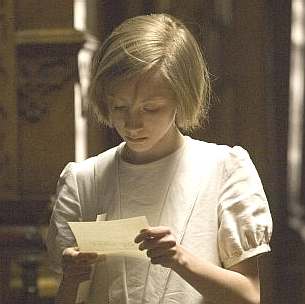
Saoirse
Ronan as Briony Tallis
(age 13)
Cast
Keira Knightley as Cecilia Tallis, the elder of the two Tallis
sisters. Originally intended to play 18-year-old Briony, Knightley was the first reported to have landed one of the starring roles in Atonement, having previously worked with Wright on the cinema adaptation of Jane Austen's Pride & Prejudice
(2005). With the director and Knightley unable to agree over which character the actress should play, Wright finally decided on Cecilia "because she has none of that Elizabeth Bennet
vibe." In preparing for her role, Knightley watched films from the 1930s and 1940s, such as Brief Encounter and In Which We Serve, to study the "naturalism" of the performances in those films that Wright wanted in
Atonement.
James McAvoy as Robbie Turner, the son of the Tallis family housekeeper with a Cambridge education courtesy of his mother's employer. Having refused previous offers to work with Wright, McAvoy was the director's first choice (producers met several actors for the role, including Jake Gyllenhaal, but McAvoy was the only one offered the part), fitting Wright's call for an actor who "had the acting ability to take the audience with him on his personal and physical journey." The actor noted that Robbie was one of the most difficult characters he had ever played, "because he’s very
straight-ahead".
Saoirse Ronan as Briony Tallis (age 13), the youngest Tallis sister and aspiring novelist. Twelve-year-old newcomer Saoirse Ronan was not cast until casting director Jina Jay had come across her after many unsuccessful auditions around Great Britain. McEwan called her performanace "remarkable": "She gives us thought processes right on-screen, even before she speaks, and conveys so much with her
eyes." Ronan received an Academy Award nomination for Best Supporting Actress for her performance.
Romola Garai as Briony Tallis (age 18): Garai was the last of all three incarnations of the younger Tallis sister to be
cast, following Abbie Cornish's refusal, who backed out due to scheduling conflicts with Elizabeth: The Golden Age
(2007). She was obliged to adapt her performance's physicality to fit into the Briony appearance that had already been decided upon for Ronan and Redgrave, spending time with Ronan and watching footage of her to approximate the way the younger actress
moved".
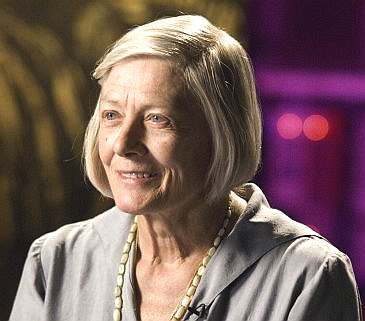
Vanessa Redgrave as Briony Tallis
(age 77)
Vanessa Redgrave as Briony Tallis (age 77): Everyone's ideal to play the older Briony, Vanessa Redgrave was the first approached (although she was not cast until they had found
Ronan), committing to the role after one meeting with Wright. Accordingly, she, Ronan, and Garai worked with a voice coach to keep the character’s timbre in a similar range throughout the
story.
Harriet Walter as Emily Tallis, the matriarch of the family. Both Emily
Watson and Kristin Scott Thomas were approached to play the role of Emily Tallis before the role went to Walter.
Patrick Kennedy as Leon Tallis, the eldest of the Tallis siblings.
Brenda Blethyn as Grace Turner, Robbie's mother, the Tallis family housekeeper
Juno Temple as Lola Quincey, the visiting 15-year-old cousin of the Tallis siblings
Charlie and Felix von Simson as Jackson and Pierrot Quincey, Lola's nine-year-old twin brothers
Benedict Cumberbatch as Paul Marshall, a visiting friend of Leon Tallis
Danny Mays as Tommy Nettle, a fellow soldier of Robbie
Nonso Anozie as Frank Mace, another fellow soldier
Anthony Minghella as the Interviewer
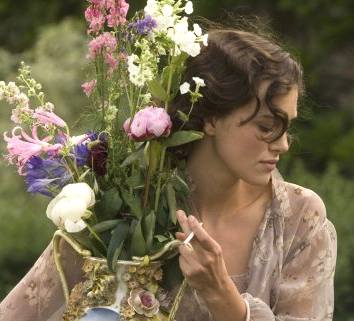
Production
The film was produced by Working Title Films and filmed throughout the summer of 2006 in Great Britain and
France.
Locations
Redcar's beach was the site of the Dunkirk beach sequence, and also stood in for Bray-Dunes (original film set; August 2006).Locations for the filming included the seafront in
Redcar; Streatham Hill, South London (standing in for Balham, Cecilia's new home after becoming estranged from her family); Stokesay near Craven
Arms; and Grimsby.
All the exteriors and interiors of the Tallis family home were filmed at Stokesay Court, Onibury, Shropshire, and chosen from the pages of an old copy of Country Life
magazine. The Victorian mansion was built in 1889 by glove manufacturer John Derby-Allcroft and is still privately owned. London locations included Whitehall and Bethnal Green Town Hall, latter being used for a 1939 tea house scene, as well as St John's, Smith Square, Westminster, which served as location for Lola's wedding. The scenes from the 1940 Balham station were filmed in the former Piccadilly Line station of Aldwych, which was closed in the 1990s. Parts of the St. Thomas's hospital ward interior and corridors were filmed at Park Place, Henley-on-Thames; the exterior of the hospital actually being University College
London.
While the third portion of Atonement was entirely filmed at the BBC Television Centre in Wood Lane, the beach and cliff scene first shown on the postcard and later seen towards the end of the film were filmed at the
Seven Sisters, Sussex, more precisely at
Cuckmere Haven which is incidently quite near to Roedean School which Cecilia was said to have attended. The scenes of the French countryside were filmed in Coates and Gedney Drove End, Lincolnshire; Walpole St. Andrew and Denver, Norfolk; and in March and Pymore, in Cambridgeshire. The scenes shot in Redcar include the seafront as a war-torn
Dunkirk and a scene in the local cinema on the
promenade.
Release
The film opened the 2007 Venice International Film Festival, making Wright, at the age of 35, the youngest director ever to be honored
so. The film also opened the 2007 Vancouver International Film
Festival. Atonement was released in the United Kingdom and Ireland on 7 September
2007, and in North America on 7 December 2007. Worldwide distribution was managed by
Universal Studios, with minor releases through other
divisions.
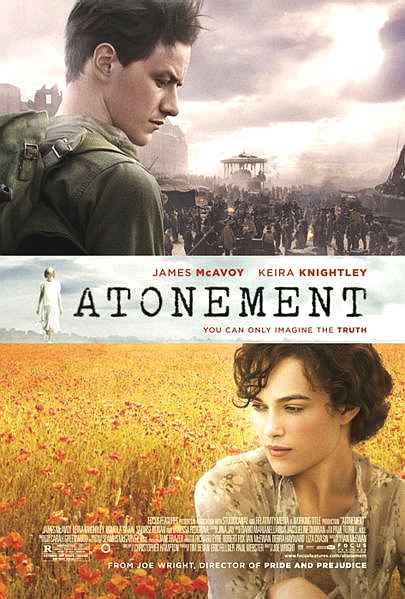
Atonement
movie poster, James McAvoy and Keira Knightley
Reception
Critical reception
The film has received positive reviews by the vast majority. As of January 18, 2008, the review aggregator Rotten Tomatoes records that 82% of 171 critics gave the film positive reviews, with a consensus that the film's "strong performances, brilliant cinematography, and lovely score make for a very successful adaptation of Ian McEwan's novel."
On the other review aggregator, Metacritic records an average score of 85%, based on 36
reviews. Roger Ebert gave it a four star review saying that the movie was "one of the year's best films, a certain best picture
nominee." The film was listed as number 3 on Empire Magazine's top 25 films of 2007.
Keira Knightley attending the premiere of Atonement, in Leicester Square,
London Time magazine's Richard Corliss named the film one of the Top 10 Movies of 2007, ranking it at #4. Corliss praised the film as "first beguiling, then devastating", and singled out Saoirse Ronan as "terrific as the confused
12-year-old."
On December 13, 2007 it received 7 Golden Globe nominations, more than any other film nominated for the 65th Golden Globe
Awards. On January 13, 2007, the film won 2 Golden Globes, including Best Motion Picture Drama.
On January 16, 2008, the film received 14 BAFTA nominations for the 61st British Academy Film Awards including Best Film, Best British Film and Best Director.
On January 22, 2008, Atonement received 7 Academy Award nominations, including Best Picture.
On February 4, 2008 it received the Evening Standard British Film Award for Technical Achievement in Cinematography, Production Design and Costume Design, earned by Seamus McGarvey, Sarah Greenwood and Jacqueline Durran, respectively.
Top ten lists
The film appeared on many critics' top ten lists of the best films of
2007.
1st - Kenneth Turan, Los Angeles Times
1st - Lou Lumenick, New York Post
2nd - Peter Travers, Rolling Stone,
3rd - Empire
4th - Ann Hornaday, The Washington Post
4th - Joe Morgenstern, The Wall Street Journal
4th - Richard Corliss, TIME magazine
4th - Roger Ebert, Chicago Sun-Times
4th - Tasha Robinson, The A.V. Club
7th - Nathan Rabin, The A.V. Club
8th - James Berardinelli, ReelViews
8th - Keith Phipps, The A.V. Club
8th - Stephen Holden, The New York Times
9th - Marjorie Baumgarten, The Austin Chronicle
10th - Michael Sragow, The Baltimore Sun
10th - Noel Murray, The A.V. Club
Box office
The film was released in the United Kingdom and Ireland on September 7, 2007 and it has grossed £11,557,134. The film was also given a limited release in North America on December 7, 2007 and it grossed $784,145 in its opening weekend, posting a per-theater average of $24,504 in 32 theaters. As of February 21, 2008 the film has grossed
$48,187,111 in the US and $114,477,249
worldwide.

Awards
Wins
Atonement has been named among the Top 10 Films of 2007 by the Austin Film Critics Association, the Dallas-Fort Worth Film Critics Association, the National Board of Review, the New York Film Critics Online, the Oklahoma Film Critics Circle, and the Southeastern Film Critics
Association.
80th Academy Awards: Achievement in Music Written for Motion Pictures - Original Score (Dario
Marianelli)
61st British Academy Film Awards: Best Film (Tim Bevan, Eric Fellner, Paul Webster), Best Production
Design (Sarah Greenwood, Katie
Spencer)
Golden Tomato Awards: Best Romance
Houston Film Critics Society Awards: Top 10 Films, Best Original Score (Dario
Marianelli)
65th Golden Globe Awards: Best Motion Picture Drama, Best Original Score - Motion Picture (Dario
Marianelli)
International Film Music Critics Association Awards: Film Score of the Year (Dario Marianelli),
Best Original Score - Drama (Dario Marianelli), Film Music Composition of the Year (Elegy for Dunkirk, Dario
Marianelli)
Las Vegas Film Critics Society Awards: Best Youth Performance - Female (Saoirse
Ronan)
London Film Critics Circle Awards: British Actor of the Year (James McAvoy), British Actress in a Supporting Role (Vanessa
Redgrave)
Phoenix Film Critics Society Awards: Top 10 Films, Best Cinematography (Seamus McGarvey), Best Original Score (Dario Marianelli), Best Performance by a Youth in a Lead or Supporting Role (Saoirse
Ronan)
San Diego Film Critics Society Awards: Top 7 Films, Best Editing (Paul Tothill)
Satellite Awards: Best Adapted Screenplay (Christopher Hampton)
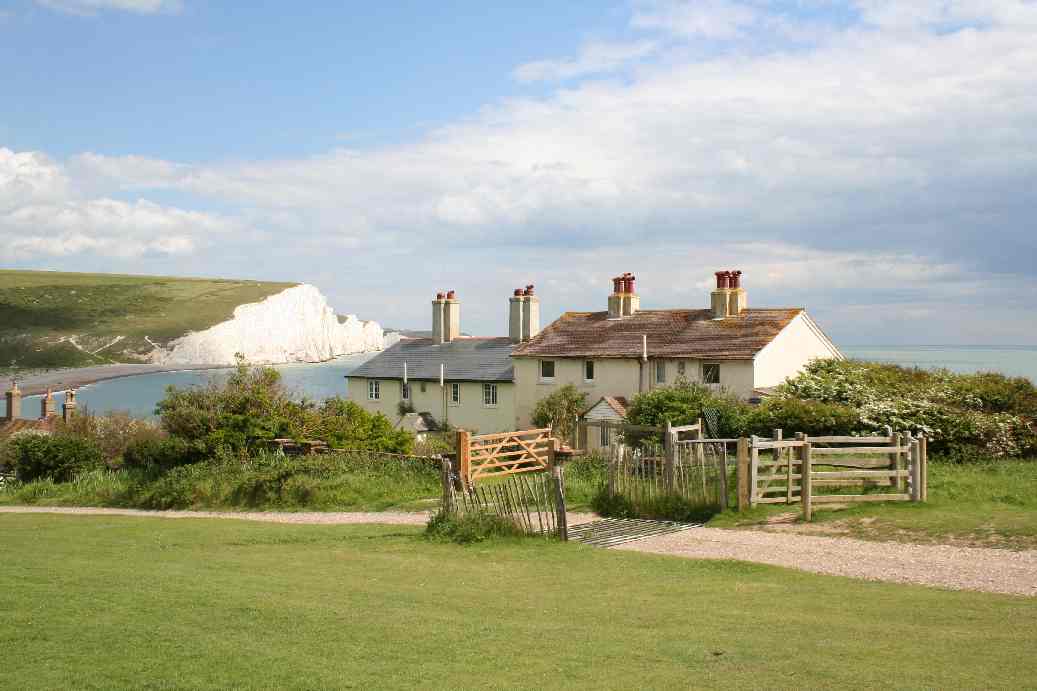
Seaford
Head, view across to Seven Sisters white cliffs from Coastguard
Cottages
Nominations
80th Academy Awards Best Motion Picture of the Year (Tim Bevan, Eric Fellner, Paul Webster),
Best Performance by an Actress in a Supporting Role (Saoirse Ronan), Best Adapted Screenplay (Christopher Hampton), Achievement in Art Direction (Sarah Greenwood, Katie Spencer),
Achievement in Cinematography (Seamus McGarvey), Achievement in Costume Design (Jacqueline Durran)
12th Art Directors Guild Awards: Excellence in Production Design for a Feature Film - Period Film (Sarah Greenwood)
22nd American Society of Cinematographers Awards: Outstanding Achievement in Cinematography in Theatrical Releases (Seamus McGarvey).
61st British Academy Film Awards: Best British Film (Tim Bevan, Eric Fellner, Paul Webster, Joe Wright, Christopher Hampton), Best Director (Joe Wright), Best Adapted Screenplay (Christopher Hampton),
Best Leading Actor (James McAvoy), Best Leading Actress (Keira Knightley), Best Supporting Actress (Saoirse Ronan), Best Music (Dario Marianelli), Best Cinematography (Seamus McGarvey),
Best Editing (Paul Tothill), Best Costume Design (Jacqueline Durran), Best Sound (Danny Hambrook, Paul Hamblin, Catherine Hodgson), Best Make Up and Hair (Ivana Primorac).
Broadcast Film Critics Association Awards: Best Picture, Best Director (Joe Wright), Best Supporting Actress (Vanessa Redgrave), Best Composer (Dario Marianelli), Best Young Actress (Saoirse Ronan)
Chicago Film Critics Association Awards: Best Adapted Screenplay (Christopher Hampton), Best Cinematography (Seamus McGarvey), Best Original Score (Dario Marianelli)
10th Costume Designers Guild Awards: Excellence in Period Costume Design for Film (Jacqueline Durran)
Dallas-Fort Worth Film Critics Association Awards: Best Supporting Actress (Saoirse Ronan),
65th Golden Globe Awards: Best Director - Motion Picture (Joe Wright),
Best Performance by an Actor in a Motion Picture - Drama (James McAvoy), Best Performance by an Actress in a Motion Picture - Drama (Keira Knightley), Best Performance by an Actress in a Supporting Role in a Motion Picture (Saoirse Ronan), Best Screenplay - Motion Picture (Christopher Hampton)
International Film Music Critics Association Awards[48]: Composer of the Year (Dario Marianelli)
London Film Critics Circle Awards:
The Attenborough Award for British Film of the Year, British Director of the Year (Joe Wright), British Actress of the Year (Keira Knightley), British Actress in a Supporting Role (Saoirse Ronan), Screenwriter of the Year (Christopher Hampton), British Breakthrough – Acting (Saoirse Ronan)
55th Motion Picture Sound Editors Golden Reel Awards[50]: Best Sound Editing - Sound Effects, Foley, Dialogue and ADR in a Foreign Feature Film (Becki Ponting, Peter Burgis)
Online Film Critics Society Awards:
Best Picture, Best Supporting Actress (Saoirse Ronan), Best Adapted Screenplay (Christopher Hampton), Best Cinematography (Seamus McGarvey), Best Editing (Paul Tothill), Best Score (Dario Marianelli)
Satellite Awards:
Best Actress in a Motion Picture - Drama (Keira Knightley), Best Actress in a Supporting Role - Drama (Saoirse Ronan), Best Costume Design (Jacqueline Durran), Best Original Score (Dario Marianelli)
St. Louis Gateway Film Critics Association Awards:
Best Picture, Best Supporting Actress (Saoirse Ronan), Best Cinematography Runner-Up (Seamus McGarvey), Best Screenplay (Christopher Hampton), Best Score (Dario Marianelli)
Southeastern Film Critics Association Awards:
Best Director (Joe Wright), Best Adapted Screenplay (Christopher Hampton)
USC Libraries Scripter Award:
Best Realization of a Book Adapted to Film (Christopher Hampton, screenwriter; Ian McEwan, author)
Washington D.C. Area Film Critics Association Awards:
Best Film, Best Director (Joe Wright), Best Supporting Actress (Saoirse Ronan), Best Adapted Screenplay (Christopher Hampton), Best Art Direction (Sarah Greenwood), Best Breakthrough Performance (Saoirse Ronan)
DVD
Atonement Region 2 DVD was released on February 4, 2008; the HD DVD edition will be available on March 11, 2008. The Region 1 DVD
(USA/Canada)
was released on March 18, 2008.
Taglines
-
You
can only imagine the truth.
-
Torn
apart by betrayal. Separated by war. Bound by love
-
Joined
by love. Separated by fear. Redeemed by hope.
YouTube
Links
Extended
ATONEMENT trailer - This is the extended trailer 1
min 49 sec
Atonement
Trailer - 2007 - This
is the theatrical trailer 2 min 30 sec -
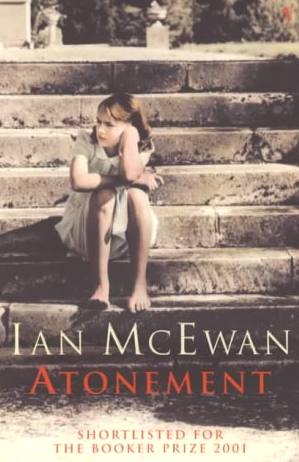
Ian
McEwan's novel 'Atonement' (book cover)
ATONEMENT
- THE NOVEL
Atonement (2001) is a novel by British writer Ian McEwan. It is widely regarded as one of McEwan's best works and was shortlisted for the 2001 Booker Prize for fiction, an award he had already won for his previous novel Amsterdam. In addition, Time magazine named it the best fiction novel of the year and included it in its All-TIME 100 Greatest
Novels, and The Observer cites it as one of the 100 best novels written, calling it "a contemporary classic of mesmerising narrative
conviction."
Atonement is one of the most celebrated and honoured books of recent years; as well as being shortlisted for the Booker Prize: it was also shortlisted for the 2001 James Tait Black Memorial Prize and the 2001 Whitbread Book Award for Novel; it has won the 2002 Los Angeles Times Book Prize for Fiction; the 2002 National Book Critics Circle Award for Fiction; the 2002 WH Smith Literary Award; and the 2004 Santiago Prize for the European
Novel.
McEwan utilises several stylistic techniques in the novel including metafiction and psychological realism.
Atonement contains intertextual references to a number of other literary works including Henry James' The
Golden Bowl, Jane Austen's Northanger Abbey, and Shakespeare's The Tempest, Macbeth, and Twelfth Night.
In late 2006 Lucilla Andrews' autobiography No Time for Romance became the focus of a posthumous controversy when it was alleged that McEwan plagiarized from this work while writing his novel Atonement. McEwan professed his
innocence. Several high profile authors leapt to his defence, including John Updike, Martin Amis, Margaret Atwood, Thomas Keneally, Zadie Smith, and the reclusive Thomas
Pynchon.
Indeed, John Updike has gone on record as saying that Atonement "was a staggering book - something no American could have
published."
A film adaptation directed by Joe Wright from a screenplay by Christopher Hampton was released by Working Title Films in September 2007 in the UK and in December 2007 in the US.
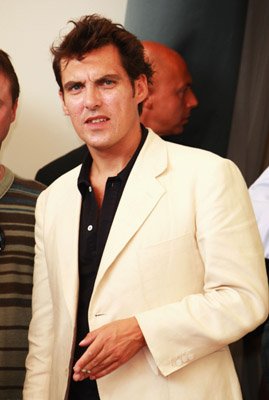
Joe Wright
- director of Atonement
Plot summary
Atonement is a complex novel told from several points of view and divided into four parts.
Part one
The story opens on a hot summer day in 1935. Precocious but naive aspiring writer Briony Tallis, aged 13, has written a play for her brother Leon, with the characters to be played by her cousins, 15-year old Lola and 9-year old twins Jackson and Pierrot.
Briony's sister, 23-year old Cecilia Tallis, has returned home from university and is confronting her confused feelings towards Robbie Turner, son of the housekeeper, whose studies were financed by her father, Jack Tallis and who, like Cecilia, studied literature at Cambridge University. While trying to water some flowers, the couple break a valuable vase and pieces fall into the fountain. Cecilia strips to her underwear and jumps into the fountain to retrieve the fragments in front of a startled Robbie. Briony witnesses the ensuing moment of sexual tension from an upstairs bedroom and is confused as to its meaning.
Leon Tallis arrives with his friend Paul Marshall, an aspiring businessman who plans to sell chocolate bars to the
Army. Leon invites Robbie to dinner, much to Cecilia's annoyance, as she is still confused as to why Robbie disturbs her so much.
Robbie, meanwhile, returns to his bungalow to write a letter to Cecilia. After finishing it, he adds a lewd suggestion on to the bottom, using the word cunt. Although he then writes another version of the letter to give to Cecilia, it is the first that is inadvertently delivered to Cecilia via Briony, who reads it and is convinced, in her fertile imagination, that Robbie is a "sex maniac". Upon reading the note, Cecilia realises her love for Robbie, and they declare their love for each other in a heated encounter in the library. Briony interrupts their lovemaking, which she interprets as a
sexual
assault upon her sister.
During dinner, the twin cousins run away, leaving a letter, and the family party begins searching for them in the extensive grounds of the estate. In the dark, Briony comes across Lola being
raped by an unknown attacker. Briony convinces herself that the rapist is Robbie, and Lola acquiesces to this claim. The police arrive to investigate, and when Robbie arrives with the rescued twins, he is arrested solely on the basis of Briony's testimony. Apart from Robbie's mother, only Cecilia believes in his innocence.
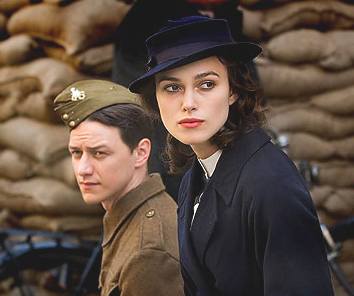
Part two
The reader follows Robbie Turner in France during the Dunkirk evacuation of 1940. As a result of Briony's accusation, Robbie spent three years in prison before being released on condition of enlistment in the army. He has been in contact with Cecilia, and she has promised that she'll wait for him. They've met only once since his arrest, a fleeting half hour spent in awkwardness, but they shared a kiss before Cecilia had to leave. At the end of part two, Robbie is still in Dunkirk, his fate unknown.
Part three
Briony is now working as a trainee nurse in London during the weeks leading up to and following the Dunkirk evacuation. She now believes that it was Paul Marshall who raped Lola in 1935 and feels guilty for accusing Robbie. In this section, it becomes apparent that Briony sees her nursing work as a kind of atonement; she effectively sent Robbie to a horrible war, and now she has given up her hope of attending university and is nursing soldiers. In a crucial scene, Briony is called to the bedside of a young French soldier who is fatally wounded and dies in her arms. Briony then attends the wedding of her cousin Lola and Paul Marshall but lacks the courage to speak out against the marriage. She finally tracks down Cecilia and promises that she will try to atone for what she has done. Robbie is with Cecilia at the time, and together they outline the legal procedures Briony will need to follow in order to exonerate Robbie.
Part four
The fourth section, titled "London 1999", is written from the perspective of Briony, now a successful novelist in her 70s. She is dying from vascular dementia. It is revealed that she is the author of the preceding sections of the novel, which are to be published only after the deaths of Lola and Paul Marshall. In the last few pages, we learn that, although they are reunited in Briony's novel, Cecilia and Robbie were never reunited in reality: Robbie died of septicemia on the beaches of Dunkirk (most likely a result of infection from a piece of shrapnel which embeds itself in his stomach and that is mentioned many times during Part Two); and Cecilia was killed in The Blitz. Though the detail concerning Lola's marriage to Paul Marshall is true, and though Briony's narrative is evasive, it seems that she never visited Cecilia, who was mourning Robbie's death, in an effort to make amends for her lie.
The novel ends with a meditation on the nature of atonement and authorship. The conclusion that Briony appears to reach is that no amount of authorial fantasizing (or, for that matter, wretched work as a nurse) can actually atone for the crime she committed as a child of 13. The ending attempts to consider differing forms of fiction
- both lies in reality and in novels - and suggests that while the one can be irrevocably destructive, the other can offer a chance at happiness unachievable in
life.
Objects and places of significance
The Trials of Arabella
The Trials of Arabella is a play written by Briony Tallis in 1935 with the intention to teach her brother Leon to be more serious when it came to relationships. The play inevitably never gets performed due to the lack of cooperation of Jackson and Pierrot, and the further complications that follow. The Trials of Arabella is later performed in 1999 during Briony's 77th birthday by various young grandchildren.
The Tallis Estate
The Tallis Estate is located in the Surrey Hills in England, being the family home and also the site of the Tallis family party for Briony's 77th birthday. It is at The Tallis Estate that the key moments of the exposition of the story take place. The first part of the book completely takes place on this estate.
The vase
The vase is an important motif in the book. It originally belonged to Mr Tallis's brother, who received it as a present for saving the inhabitants of a town near Verdun during the first World War. Although it is very valuable, the Tallis family decides to keep using it, thus honouring its owner's memory.
The vase causes the first “real” encounter between Cecilia and Robbie (who seemingly keep ignoring each other since their return from university), when, by the fountain, they fight over the vase and break off some shards, and Cecilia undresses to get them out of the fountain. This incident also leads to (the different versions of) Robbie's apologetic letter. The subject of the vase comes up again when Briony visits Cecilia and Robbie and mentions that the vase has been broken; Cecilia is clearly unsettled by the news.
Dunkirk
The second section of the book contains detailed descriptions of the Dunkirk evacuation, in which Robbie takes part, and gives an impressive account of his war experiences.
In the fourth part, Briony is shown gathering information and obtaining opinions about the war in order to give as realistic a description as possible in her book.
The hospital
Both Cecilia and Briony become nurses and are trained at the same hospital in London. Briony (who could have had a comfortable student life at Cambridge) presumably chooses hard and lowly work to atone for her wrongdoing. In the hospital, Briony comes in contact with the harsh reality of war, and, some experts may argue, the hospital represents Briony finally growing up to the realisation of her mistakes.
Literary criticism
Finney, Brian (2004) "Briony's Stand Against Oblivion: The Making of Fiction in Ian McEwan's Atonement." Journal of Modern Literature 27(3), p68-82.
Harold, James (2005) "Narrative Engagement with Atonement and The Blind Assassin." Philosophy and Literature 29(1), p130-145.
Schemberg, Claudia (2004) "Achieving 'At-one-ment': Storytelling and the Concept of Self in Ian McEwan's The Child in Time, Black Dogs, Enduring Love and Atonement" Frankfurt am Main: Peter Lang.
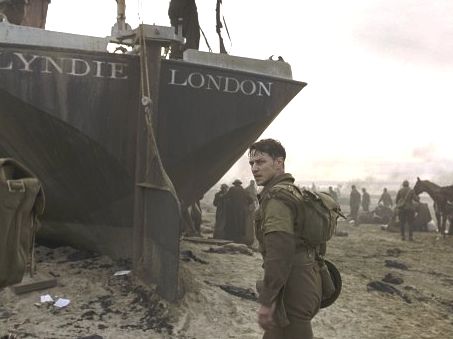
LINKS
and REFERENCE
-
Summaries
and Analyses
-
Atonement
on McEwan's official
website
-
Atonement
on InÉdit
-
Complete
Review review
-
Ian
McEwan on Mostlyfiction.com
-
Salon
review
-
Ian
McEwanon Blogcritics.com
-
The
most honored novels: Atonement has received
numerous honors and is near the top of the list
-
On
ABC Radio NationalInterview with Ramona Koval
-
Photos
of the first edition of Atonement
-
Cast,
Crew and Production Details
-
Keira
Knightly shines in Atonement. The Age
-
"Academy
Award nominations for Atonement", Academy
Awards,
-
"BAFTA
Awards for Atonement", BAFTA,
-
Behind
the Scenes of Atonement. WildaboutMovies.com.
-
"Keira
Knightley & Director Clashed Over Atonement
Character". Starpulse.
-
"Look
who's kissing Keira". Daily Mail.
-
"Atonement
Gears Up for Start of Filming". Working Title
Films (Official website).
-
A
Modern Version of that Stiff Upper Lip. Close-UpFilm.
-
"Junior
pop idols need not apply". Daily Mail.
-
Hencke,
David. "Redcar
scrubs up for starring role", The
Guardian,
-
"Joe
Wright: a new movie master". Daily Telegraph.
-
Atonement
(2007) - Filming locations
-
Conway
Morris, Roderick. "Review:
'Atonement' and 'Se, jie' at Venice festival: Love and lust in
wartime", International Herald Tribune
-
http://www.focusfeatures.com
-
Atonement
- Rotten Tomatoes.
-
Atonement
(2007): Reviews. Metacritic.
-
Ebert,
Roger. No
Atonement. Retrieved on 28 December 2007.
-
Corliss,
Richard; “The 10 Best Movies”; Time
magazine.
-
Corliss,
Richard; “The 10 Best Movies”; time.com
-
Atonement
leads field at Globes.
-
Hollywood
Foreign Press Association 2008 Golden Globe Awards for the
Year Ended December 31, 2007. goldenglobes.org
-
Metacritic:
2007 Film Critic Top Ten Lists. Metacritic.
-
Travers,
Peter, "Peter
Travers' Best and Worst Movies of 2007" Rolling
Stone.
-
Atonement
(2007). Box Office Mojo.
-
2007
Austin Film Critics Association Awards
-
2007
Dallas-Fort Worth Film Critics Association Awards
-
2007
National Board of Review
-
2007
New York Film Critics Online Awards
-
2007
Oklahoma Film Critics Association Awards
-
2007
Southeastern Film Critics Association Awards
-
Best
Romance film at Rotten
-
2007
Houston Film Critics Society Awards
-
2007
Golden Globe Awards
-
2007
International Film Music Critics Awards
-
2007
Las Vegas Film Critics Society Awards
-
2007
London Film Critics Circle Awards Results
-
2007
Phoenix Film Critics Society Awards
-
2007
San Diego Film Critics Society Awards
-
2007
Satellite Awards
-
2007
Art Directors Guild
-
2007
American Society of Cinematographers Awards
-
2007
British Academy Film Awards Nominations
-
2007
Broadcast Film Critics Association Awards
-
2007
Chicago Film Critics Association Awards
-
2007
Costume Designers Guild
-
2007
Golden Globe Awards
-
2007
International Film Music Critics Awards
-
2007
London Film Critics Circle Awards
-
2007
Golden Reel Awards
-
2007
Online Film Critics Society Awards
-
2007
St. Louis Gateway Film Critics Association Awards
-
2007
USC Libraries Scripter Awards
-
Focus
Features Atonement Awards
-
DVD
Release on The New York Times
-
Universal
official statement for Atonement DVD

A
- Z FILMS INDEX
A
- Z ACTORS INDEX


A
heartwarming adventure: Pirate
whalers V Conservationists,
with
an environmental
message.
For
release as an e-book in 2013 with hopes for a film in
2015 TBA
(graphic
design: Martin
House)
|













